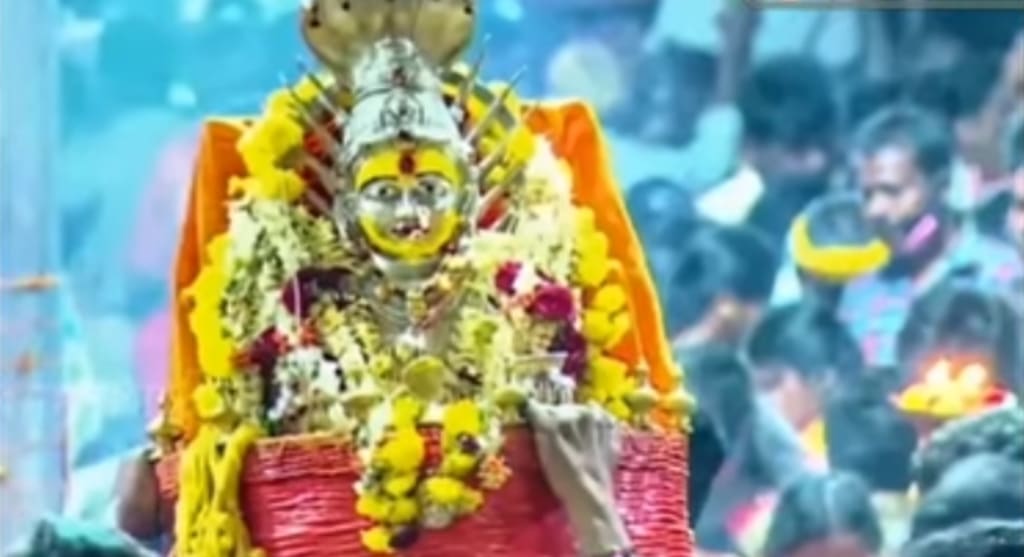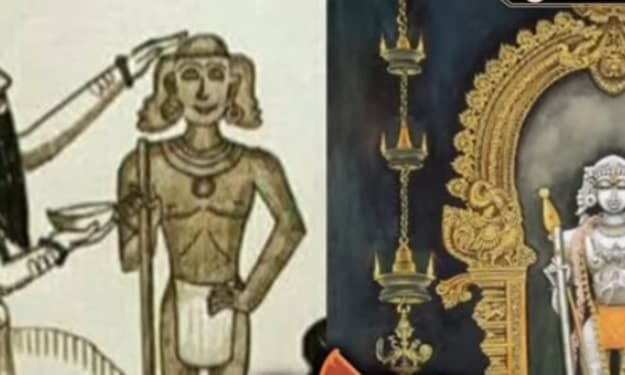Pannari Amman history
obscure. The goddess is generally depicted as a important and benevolent figure who watches over her followers, furnishing them with guidance, strength, and substance. Mythologically, Pannari Amman is frequently linked with the broader pantheon of Amman divinities, who are considered colorful forms of Parvati, the consort of Lord Shiva. In numerous legends, these goddesses are seen as fierce defenders who can shield off evil spirits and conditions, reflecting the binary nature of Parvati as both a gentle mama and a redoubtable legionnaire.

** Pannari Amman A Revered Deity in South Indian Tradition ** Pannari Amman is a prominent deity worshipped in colorful corridor of South India, particularly in the state of Tamil Nadu. The deification of Amman, or goddess, is a significant aspect of Tamil church and culture, with Pannari Amman being one of the numerous instantiations of the godly womanlike deified in this region. The goddess Pannari Amman is frequently associated with protection, fertility, and the well- being of her addicts, embodying the nurturing and fierce aspects of the mama goddess. Origins and Mythology The deification of Pannari Amman is deeply embedded in the ancient traditions of South India. The name" Pannari" is believed to be deduced from original cants, although its exact etymological origins remain kindly
obscure. The goddess is generally depicted as a important and benevolent figure who watches over her followers, furnishing them with guidance, strength, and substance. Mythologically, Pannari Amman is frequently linked with the broader pantheon of Amman divinities, who are considered colorful forms of Parvati, the consort of Lord Shiva. In numerous legends, these goddesses are seen as fierce defenders who can shield off evil spirits and conditions, reflecting the binary nature of Parvati as both a gentle mama and a redoubtable legionnaire.
Pannari Amman, like other Amman divinities, is worshipped for her capability to heal, cover, and nurture, making her an integral part of the original spiritual geography. tabernacles and Worship Practices tabernacles devoted to Pannari Amman are set up across Tamil Nadu, frequently in pastoral areas where she's particularly deified. These tabernacles are generally simple structures, reflecting the humble origins of her deification. still, some have grown in size and significance over the centuries, getting important centers of original passage and devotion.
The armature of these tabernacles is generally Dravidian, characterized by towering gopurams( gateway halls) adorned with intricate busts depicting colorful divinities, mythological scenes, and motifs from Hindu cosmology. Inside the tabernacle, the sanctum sanctorum houses the main hero of Pannari Amman, frequently depicted with a fierce expression, holding munitions, and adorned with flowers and beautifiers.
Worship practices at Pannari Amman tabernacles are vibrant and deeply collaborative. Addicts frequently perform special rituals known as “ poojas ” to seek the goddess's blessings. These rituals include immolations of flowers, fruits, and other particulars, accompanied by the chanting of hymns and the lighting of lights. One unique aspect of Amman deification is the practice of" poo choodal," where addicts place libraries and flowers on the goddess's hero as a sign of reverence and devotion.
Carnivals devoted to Pannari Amman, similar as the periodic tabernacle jubilee or “ thiruvizha, ” are major events in the original community. These carnivals involve processions, music, cotillion , and colorful forms of folk entertainment, creating a vibrant and gleeful atmosphere. The highlight of these carnivals is frequently the" kavadi attam," a cotillion performed by addicts carrying ornate structures called" kavadis" as an act of devotion and penance.
Artistic and Social Significance The deification of Pannari Amman isn't just a religious practice but also a vital part of the artistic and social fabric of the communities that venerate her. She's seen as a guardian of the vill, guarding the occupants from detriment and icing their well- being. In times of extremity, similar as during pandemics or natural disasters, the community frequently turns to Pannari Amman for protection and relief, conducting special rituals to assuage the goddess and seek her intervention.
Pannari Amman also plays a pivotal part in agrarian societies. As a fertility goddess, she's invoked to bless the land and insure bountiful crops. growers offer the first fruits of their crop to the goddess, thanking her for her blessings and seeking her continued favor for unborn crops. The deification of Pannari Amman also reflects the maternal aspects of Tamil society, where the mama goddess is reverenced as the ultimate source of life and food. This deep respect for the womanlike godly is apparent in the way women are frequently involved in tabernacle rituals and carnivals, with numerous serving as crucial organizers and actors. Contemporary Applicability In contemporary times, the deification of Pannari Amman continues to thrive, conforming to ultramodern surrounds while retaining its traditional substance. numerous tabernacles have embraced technology, using social media and other platforms to reach a wider followership and grease virtual participation in rituals and carnivals.
This has helped in keeping the youngish generation connected to their artistic roots and icing the durability of these ancient traditions. also, the values embodied by Pannari Amman — protection, nurturing, and adaptability — remain applicable moment, reverberating with the challenges and bournes of ultramodern addicts. Her deification provides a sense of community and durability, linking the history with the present and offering a source of strength and alleviation for the future.
Conclusion Pannari Amman is a important symbol of the godly womanlike in Tamil culture, embodying both the nurturing and defensive aspects of the mama goddess. Her deification is deeply hardwired in the social and artistic life of the communities that venerate her, reflecting a rich shade of traditions, beliefs, and practices. As a guardian, healer, and source of fertility, Pannari Amman continues to inspire and bless her addicts, icing that her heritage endures through the periods.
About the Creator
Enjoyed the story? Support the Creator.
Subscribe for free to receive all their stories in your feed. You could also pledge your support or give them a one-off tip, letting them know you appreciate their work.





Comments
There are no comments for this story
Be the first to respond and start the conversation.